.
Noam Chomsky is a linguist who has helped to change the way that we see language and its place in the human mind. that we see language and its place in the human mind. Language for Noam Chomsky is more than just a tool that human beings happen to use but a window into how human beings function at their most basic level. In order to understand what Noam Chomsky has accomplished within linguistics it will help to have a general historical overview of the field from when he began his work in the 1950s.
When Noam Chomsky first started studying linguistics as a graduate student at Harvard the field was dominated by a theory known as behaviorism. Behaviorists refused on principle to consider the inner mechanisms of human thought and chose Instead to explain human behavior through and chose Instead to explain human behavior through stimulus and response mechanisms. According to cruder versions of this theory human beings were not much more than machines with on or off switches that could be put one way or the other by outside influence. way or the other by outside influence.
The way that human beings were supposed to learn language, or anything else for that matter, was through training that rewarded them for the right responses and that punished rewarded them for the right responses and that punished them when they made the wrong ones. This understanding based around experiments mostly performed with mice and other animals who could be trained to perform a multitude of tasks through similar means.
Noam Chomsky first criticized behaviorism as a graduate student in a famous review of B.F. Skinner’s Verbal Behavior. Skinner was considered the leading theorist of behaviorism and his book was the most up to date account of behaviorist theory. Partly because the criticism in the behaviorist theory. Partly because the criticism in the review was considered so explosive, it took several years before it was actually published in 1959.
Chomsky provided many detailed critiques of the reasoning used by behaviorists in his review but the main thrust of his criticism was that behaviorism could not provide an adequate account of language. How was it, he asked, that all human beings regardless of intelligence or background were able to achieve a mastery of language sometime around the age of three?
Chomsky found that behaviorists and other theorists of the time had failed to do justice to how complex human language actually Is and how remarkable It is as a system for communication. Human beings use language creatively in new and novel ways almost every time that they make a sentence Human language responses can’t be predicted according to simple formulas of stimulus and response.
Chomsky argued that behaviorism was either irrelevant when it came to human language acquisition or meaningless as it attempted to a pply terms developed from studies done with other animals to human beings. This review by Chomsky was perhaps one of the most influential book reviews to ever be published. Partly because of it behaviorism went from being the leading psychological theory to a laughing stock.
After accepting a teaching position at MIT Noam Chomsky worked with students and other colleagues to create what became known as the “Chomskyan Revolution” in linguistics Linguistics first needed to achieve what is now known as descriptive adequacy to understand human language. Noam Chomsky created the first phrase structure grammar that was capable of fully detailing the structures that underlie human sentences.
A phrase structure grammar is made up of rules that allow a person to combine the different elements of language together to make up new sentences Sentences are composed of phrases such as noun phrases or verb phrases that can be precisely defined. At the heart of the phrase structure grammars created by Chomsky and his colleagues was a mathematical property known as recursion.
Recursion allows you to combine a finite number of elements together in an infinite number of ways. You can take, for Instance, the letters of an alphabet and combine them to create an infinite number of new words You can then take these words and combine them to create an Infinite number of new phrases. You can take these phrases and then combine them to create an infinite number of new sentences.
At any time our language Is capable of an infinite number of new expressions. Not just by inventing new words but by combining existing words in new ways we have it in our power to convey any meaning that we can conceive.
